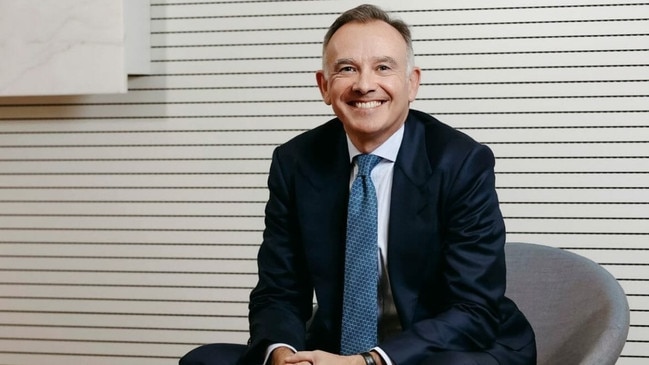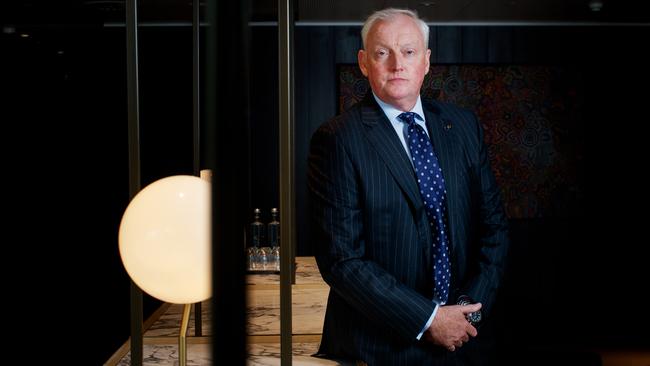‘Boutiques, not monoliths, get mandates’, says Perpetual’s new chief Bernard Reilly
Perpetual’s new chief executive, Bernard Reilly, is confident the firm can turn around the tide of financial outflows, but concedes it will take time.

Business
Don't miss out on the headlines from Business. Followed categories will be added to My News.
Perpetual’s new chief executive, Bernard Reilly, will give greater autonomy to the asset manager’s boutique investment houses as he seeks to cut costs in the Australian business and stem the outflows which have plagued the 138-year-old firm in recent years.
Speaking to The Australian ahead of Perpetual’s annual meeting scheduled for Thursday, Mr Reilly conceded it would take time for flows to turn around. He linked the anticipated recovery to an improved investment performance which he said would come from providing the firm’s numerous global boutiques with a degree of independence.
“We need to be a more efficient business … (we are) a multi-boutique, global asset manager; and the operating model I’m working on at the moment is that I want to make sure the portfolio managers have the autonomy to deliver alpha for clients,” Mr Reilly said.
“The cost base is one that we need to make sure is right sized for the business going forward and there’s a bit of work to do on that.
“On the distribution strategy we have for a global asset manager, there’s areas of focus and refinement that we need to make. We need to make sure we’ve got the right resource allocation in Europe and in Asia Pacific.”
Giving more autonomy to the boutiques would allow for a “slimmed down” head office in Australia, he said.
The turnaround of the J O Hambro business in the UK, meanwhile, would be important in the medium term.
Mr Reilly, who was formerly CEO at $230bn super fund Australian Retirement Trust, said asset owners were not seeking out “large monoliths” to manage their money.
“If I think about where mandates come from, asset owners are looking at boutique managers because they’re nimble and they’re able to deliver alpha. So I do believe the flows for alpha will continue to go to boutique managers. But you also need to have the scale of a broader organisation,” he said.
Perpetual’s latest quarterly numbers for the three months through to June 30, showed a sea of red across all divisions as investors withdrew $9bn from the wealth manager. Mr Reilly would not comment on the September quarter outflows, which have not yet been released to the market, but said the flows would take time to turn around.

He stepped into the CEO role at Perpetual in early September and has been tasked with getting the mammoth $2.2bn sale of its wealth and corporate trust businesses to private equity giant KKR over the line, in the face of fierce shareholder criticism.
An Australian powerhouse, it has churned out a star fund managers over the years including Anton Tagliaferro, Peter Morgan, John Sevior, Matt Williams and Paul Skamvougeras. Perpetual under former CEO Rob Adams shifted from its traditional domestic roots to become a global funds manager, scooping up businesses in the US and Europe such as Barrow Hanley, J O Hambro, Trillium and TSW, all in a bid to drive scale benefits.
In Australia, Perpetual acquired rival Pendal in a $2bn takeover that was completed in early 2023 and left the asset manager saddled with debt.
In the wake of a takeover offer from its largest shareholder and rival, Soul Patts, and a squeeze on borrowing costs, Perpetual in May agreed to sell its valuable corporate trust and wealth management business – as well as the brand name Perpetual – to KKR. At the same time Mr Adams announced his resignation.
The wealth manager heavily criticised at the time, as shareholders had no idea what the net proceeds from the sale would be – as separation and transaction costs, as well as a hefty capital gains tax bill, were undisclosed.
Mr Reilly on Tuesday said there was no further update on the tax element, and that the firm was still awaiting a final decision from the ATO. Shareholders are due to vote on the transaction in January.
If the deal gets the green light, investors will be left with a funds management business with $215bn in assets across seven brands.
But there will also be $75m in stranded costs on the table, plus a further $50m in annual costs set to play out over 18 months.
Former Perpetual head of Australian equities Peter Morgan said Mr Reilly was “trying to clean up the mess” left by Mr Adams but that “the damage has been done”.
“It’s been four months since they made the announcement (on the KKR deal) and the stock price has fallen from $23 to under $20. We’re still left trying to work out what we’ll be left with once the businesses are sold,” Mr Morgan, who is also a shareholder, said.
“It’s not the business it was 10 or 20 years ago. It’s now an unknown spider web of fund management businesses all over the world.
“And (Perpetual) has almost confirmed that by the fact that Rob (Adams) has left and the chairman’s also going. It’s a mess.”
Mr Morgan said he will not attend the AGM in Sydney on Thursday, where Perpetual’s CEO and board are expected to face tough questions from disgruntled investors.
In recent weeks influential proxy advice firm ISS has taken aim at the funds manager over its board and executive pay, saying that the firm was rewarding senior management while its share price continued to be in the doldrums.
ISS has recommended shareholders block the re-election of two Perpetual directors: Mona Aboelnaga Kanaan and Paul Ruiz.
It claimed Perpetual faced a “misalignment” between pay and the performance of the business, which posted a $472m loss in its last set of results. The proxy firm said Perpetual had shown “no justification” for executive bonuses, noting they were “materially misaligned with performance and shareholder returns”.
Originally published as ‘Boutiques, not monoliths, get mandates’, says Perpetual’s new chief Bernard Reilly



